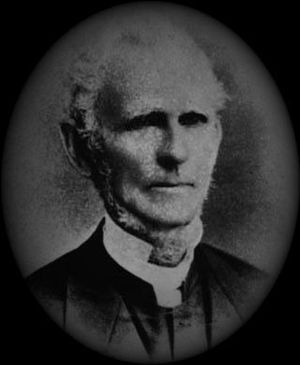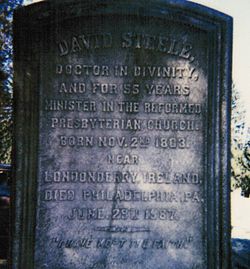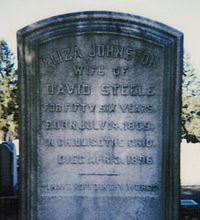- David Steele (minister)
-
David Steele, Sr. (2 November 1803 – 29 June 1887) was a Reformed Presbyterian or Covenanter minister. He was born in Upper Creevagh, Donegal, Ireland to David Steel and Sarah Gailey. His father was a fourth-generation descendant of Capt. John Steel of Lesmahagow, Lanarkshire, Scotland, a local leader in the Covenanter uprising of 1679.[1]:625 His grandparents, on both sides of the family, were Covenanters. His paternal grandfather, John Steel, had resided in Fanet. He moved to Creevaugh sometime prior to the birth of his grandson. His maternal grandfather, Andrew Gailey, resided in Killylastin. His father died when he was an infant, in February, 1805. According to Steele, his only recollection of his father was conducting family worship.[2]:13 Next to the Bible, Steele claimed the greatest impression made on him, in his youth, was Thomas Boston's Four-fold State of Man and A Cloud of witnesses for the royal prerogatives of Jesus Christ.[2]:18 The latter work is an account, published in 1714, of the Scottish martyrs who perished during the persecutions, known as the "Killing Times", during the reigns of Charles II and James VII. In his seventeenth year [1820], he entered the Academy in Londonderry, where he pursued his studies for three years, including the study of languages.[3]:688
In 1824 he emigrated to the United States. He settled in Huntingdon, Pennsylvania, where he worked, for a time, in his uncle's store, while he pursued classical studies. In the spring of 1825, he was retained to teach at the Academy of Ebensburgh. The following year he entered the Western University of Pennsylvania, from which he graduated, in 1827. After this, he began a course of studies in theology under the direction of the Rev. Dr. John Black, at Pittsburgh. In 1830, on April 8th, he was licensed by the Pittsburgh Presbytery of the Reformed Presbyterian Church.[3]:688[4]On May 4th, 1831, he married Eliza Johnston, of Chillicothe, Ross County, Ohio. He accepted the unanimous call to serve as pastor of the Reformed Presbyterian congregation in Brush Creek, Adams County, Ohio. On the 6th of June, 1831, he was ordained and installed, as the third pastor, by two brothers, members of the Ohio Presbytery, Rev. Gavin and Rev. Hugh McMillan.[5] During this time, he had several preaching assignments, one being in Mill Creek, Kentucky. When the Reformed Presbyterian Church split into "Old Lights" and "New Lights," in 1833, Steele and his Brush Creek congregation remained in ecclesiastical connection with the "Old Lights" party.[1]:417 He was appointed Clerk of Synod in 1833 and, in 1838, he was assistant clerk.[6]:314-5
After the split, in 1833, Steele expressed hope that the "Old Lights" would revive the law of the Church concerning "occasional hearing" and tighten the prohibition on "voluntary associations."[7] With the re-admission of the Rev. Robert Lusk, in 1834, he found a kindred spirit.[8]:408
These two ministers spent the next six years witnessing and challenging a return to the original Testimony together with a restoration of history to its proper place in that Testimony.[6] In 1838, he went together with a few others to attend the death bed of the Rev. William Gibson, the last surviving minister who had participated in re-erecting the Reformed Presbytery in 1798. Gibson left his dying testimony against the practice of "voluntary associations" or, as George Gillespie and Hugh Binning had called them, "unlawful confederacies."[7] This served to confirm Steele and his stricter Covenanting brethren in their course of pressing the matter in Synod. In 1840, Steele, on behalf of a number of his brethren, presented a paper (#30) to Synod petitioning for redress on the matter of "voluntary associations."[9]:179 This paper was pushed aside for later consideration at a future meeting of Synod. This was, for Steele and Lusk, the final straw.[8]
Synod adjourned on June 26th, 1840, and the following day, he protested and separated from the Reformed Presbyterian Church of North America, along with fellow minister Robert Lusk and elders William McKinley, William Wylie and Nathan Johnston, on the grounds that the RPCNA had "corrupted the doctrines and worship, and prostituted the government and discipline of the house of God".[9]. They constituted themselves as the Reformed Presbytery and set about to return the "old paths." He remained in Adams County, Ohio, until 1859, ministering to adherents in that area. At that time, he removed to Hill Prairie, near Sparta, Illinois and served adherents of Presbytery in that vicinity. In October, 1866, he moved to Philadelphia, Pennsylvania. In Philadelphia, he pastored a small congregation and established a small theological school. In 1885, he moved for a brief period of time to Galesburg, Illinois. However, in the fall of 1886, he returned to Philadelphia. It was there he died of old age and from the effects of a slight stroke of paralysis, Wednesday, June 29, 1887. His death was announced in the Public Ledger of Philadelphia on June 30th. "STEELE. - On the 29th inst., Rev. DAVID STEELE, Sr., D.D., in the 84th year of his age. The remains may be viewed by relatives and friends, on Friday evening, July 1st, from 6 until 8 o'clock, at 2732 Brown Street. Interment in Petersburgh, Pa., on Saturday morning, July 2nd, 1887." Though he was never known to use the title of "D.D." during his life, it was a degree granted him, in 1884, by the Western University of Pennsylvania. His epitaph reads, "I have kept the faith."
Grave of David Steele, Sr. Huntingdon, Pennsylvania
He devoted much of his writing to demonstrating the defection of those who called themselves Reformed Presbyterians, and chastising, the Reformed Presbyterian Church for her treacherous defection from Covenanted Reformation. He spent most of his life visiting those who adhered to the "good old way," ministering to them. He was a tremendous controversialist, and manifested great inflexibility of character, for which he was despised by "false brethren." Toward the end of his life, in 1884, he stated, "The principles...for more than 40 years defended against many opponents—especially "false brethren"—I still believe to be founded upon the Scriptures and long experience, with developments among opponents, has tended to confirm my earlier convictions." Although he lived in the United States for sixty years, he never became an American citizen, believing that the U.S. Constitution sanctioned "atheism and slavery." [10] He died in the belief that the principles which he held and propagated would one day triumph in the earth. In retrospect, even his adversaries were constrained to admit he "was a learned and powerful preacher of the gospel, an adept in ancient languages, and an independent thinker."
Grave of Eliza Johnston Steele Huntingdon, Pennsylvania
His wife of 56 years, Eliza Johnston, was born July 14, 1809, in Chillicothe, Ohio. She died April 3, 1896. Her epitaph reads, "I have hoped in thy Word."
His church survives tenuously, without ordained ministers, as the Reformed Presbyterian Church (Covenanted)[10] also known as the "Steelites." In 2010, the "David Steele Reformed Presbyterian Library" was formed to preserve and archive his documents and other documents relating to the broader Covenanting and Reformed Dissenting traditions.[citation needed] The term is also used to describe other secessions from the RPCNA and other bodies that claim inspiration from Steele, including the Reformed Presbytery in North America[11] and the Covenanted Reformed Presbyterian Church.[12]
External links
- Works by David Steele
- Works by or about David Steele in libraries (WorldCat catalog)
References
- ^ a b Evans, Nelson W. and Emmons B. Stivers. A History of Adams County, Ohio, from its Earliest Settlement to the Present Time. West Union, Ohio: E.B. Stivers, 1900. [1]
- ^ a b Steele, David. Reminiscences. Historical and Biographical of a Ministry in the Ref'd Presbyterian Church, During Fifty-Three years. Philadelphia: William Syckelmoore, 1883.
- ^ a b Glasgow, William Melancthon. History of the Reformed Presbyterian Church in America. Baltimore: Hill and Harvey, 1888.
- ^ Steele, David. Reminiscences. Historical and Biographical of a Ministry in the Ref'd Presbyterian Church, During Fifty-Three years. Philadelphia: William Syckelmoore, 1883, page 23-7.[2]
- ^ Steele, David. Reminiscences. Historical and Biographical of a Ministry in the Ref'd Presbyterian Church, During Fifty-Three years. Philadelphia: William Syckelmoore, 1883, page 27-8.[3]
- ^ "Proceedings of the Ohio Presbytery, with Remarks." The Reformed Presbyterian. 4.10 (December 1840) ed. Moses Roney. Newburgh, New York: J.D. Spalding.
- ^ Steele, David. Reminiscences. Historical and Biographical of a Ministry in the Ref'd Presbyterian Church, During Fifty-Three years. Philadelphia: William Syckelmoore, 1883, page 49-51.[4]
- ^ Steele, David. "Memoir of the Rev. Robert Lusk." Contending Witness 3.5 (March 1846) ed. David Steele. Xenia, Ohio: J.H. Purdy.
- ^ "Minutes of the Synod of the Reformed Presbyterian Church of North America, Session XX" The Reformed Presbyterian. 4.6 (August 1840) ed. Moses Roney. Newburgh, New York: J.D. Spalding.
- ^ Steele, David. Reminiscences. Historical and Biographical of a Ministry in the Ref'd Presbyterian Church, During Fifty-Three years. Philadelphia: William Syckelmoore, 1883, page 21-22.[5]
Categories:- Presbyterian ministers
- Reformed Presbyterians
- American Presbyterians
- 1803 births
- 1887 deaths
- Christian clergy stubs
- Calvinism stubs
Wikimedia Foundation. 2010.



